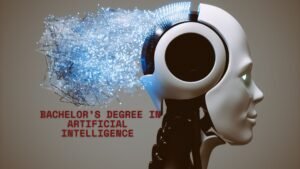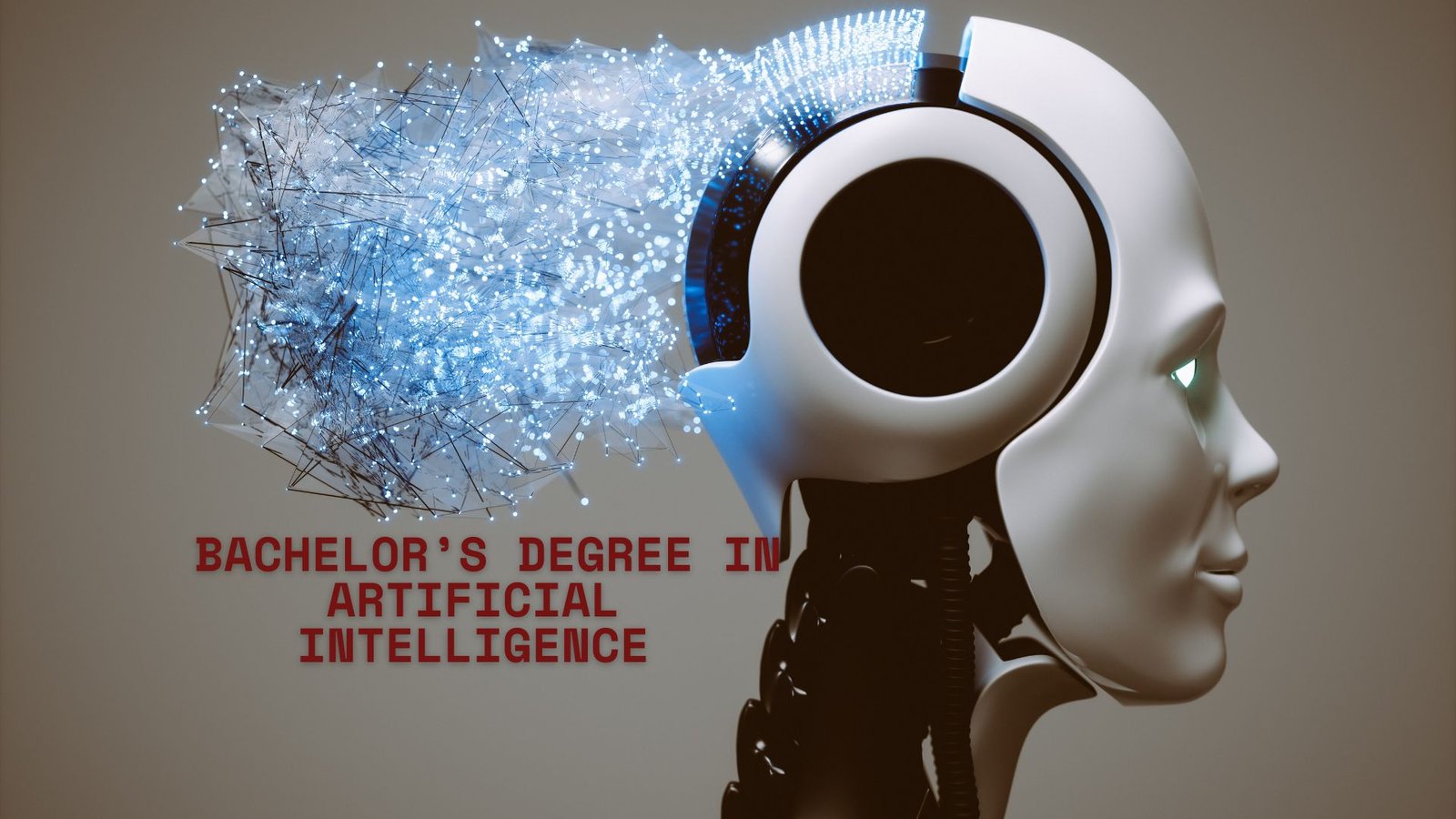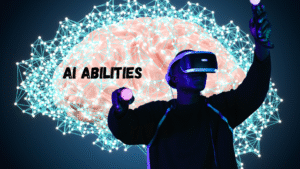Understanding the Bachelor’s Degree in Artificial Intelligence
Artificial intelligence (AI) is reshaping industries, from healthcare to finance and transportation to entertainment. As AI’s influence grows, the demand for skilled professionals who can design, develop, and implement AI technologies is surging. A Bachelor’s Degree in Artificial Intelligence provides students with the technical expertise and ethical grounding needed to excel in this dynamic field. This article explores the degree’s structure, curriculum, career prospects, top universities offering it, and its role in shaping AI’s future.

What is a Bachelor’s Degree in Artificial Intelligence?
A Bachelor’s Degree in Artificial Intelligence is a four-year undergraduate program that blends foundational computer science and mathematics with specialized AI coursework. Students develop skills in programming, algorithms, data structures, and statistics, alongside AI-specific areas like machine learning, natural language processing, and computer vision. For instance, Carnegie Mellon University, which launched the first AI bachelor’s degree in 2018, integrates technical training with ethical considerations, preparing graduates for real-world challenges (Carnegie Mellon). This comprehensive approach ensures students are equipped to handle complex AI systems.
Moreover, the degree often includes interdisciplinary elements, such as human sciences, to address AI’s societal impact. Programs emphasize practical applications, enabling students to process large datasets and create decision-making models that benefit industries and communities. As AI continues to evolve, such degrees are becoming essential for aspiring tech innovators.
Curriculum and Key Courses
The curriculum for an AI bachelor’s degree combines core computer science courses with AI-focused electives, ensuring a balanced education. Typically, students encounter the following courses:
| Course | Description |
|---|---|
| Introduction to Programming | Teaches foundational coding skills using languages like Python or Java. |
| Data Structures and Algorithms | Covers efficient problem-solving techniques critical for AI development. |
| Calculus and Linear Algebra | Provides mathematical foundations for AI models and machine learning. |
| Probability and Statistics | Equips students with tools for data-driven decision-making. |
| Machine Learning | Explores algorithms that enable systems to learn from data. |
| Artificial Intelligence Principles | Introduces core AI concepts and techniques. |
| Natural Language Processing | Focuses on enabling machines to understand and generate human language. |
| Computer Vision | Teaches machines to interpret and analyze visual data. |
| Robotics | Integrates AI with physical systems for automation. |
| Ethics in AI | Examines the societal and ethical implications of AI technologies. |
These courses provide technical proficiency and ethical awareness. For example, Carnegie Mellon’s program includes AI clusters like Decision Making and Robotics, Machine Learning, Perception and Language, and Human-AI Interaction, requiring students to take electives from each (Carnegie Mellon). This structure ensures graduates are versatile and prepared for diverse AI challenges.
Career Prospects for AI Graduates
Graduates with a Bachelor’s Degree in Artificial Intelligence are in high demand due to AI’s rapid expansion. Research from Coursera indicates AI is projected to add $19.9 trillion to the global economy by 2030, creating numerous job opportunities (Coursera). Common career paths include:
- AI Engineer: Designs and implements AI systems for various applications.
- Machine Learning Engineer: Develops algorithms for predictive modeling and data analysis.
- Data Scientist: Analyzes complex datasets to derive actionable insights.
- Software Engineer (AI focus): Builds AI-driven applications and platforms.
- Robotics Engineer: Creates intelligent machines for automation.
- Research Scientist: Advances AI through innovative research and development.
These roles offer competitive salaries, with AI engineers in the U.S. earning an average of $134,623 annually, according to Glassdoor. Opportunities span industries like healthcare, finance, technology, and autonomous vehicles, providing diverse career paths. Additionally, entry-level roles such as data analyst ($90,437) and junior AI engineer ($96,223) are accessible to recent graduates, fostering career growth.
Top Universities Offering AI Bachelor’s Degrees
Several prestigious universities offer specialized AI bachelor’s programs, each with unique strengths. Below are three notable examples:
Carnegie Mellon University
Carnegie Mellon University (CMU) pioneered the Bachelor of Science in Artificial Intelligence in 2018, setting a global standard. The program covers computer science, math, statistics, machine learning, and ethics, with opportunities for cutting-edge research. CMU’s emphasis on responsible AI, through initiatives like the Responsible AI program, ensures graduates are ethical innovators (Carnegie Mellon).
Illinois Institute of Technology
The Illinois Institute of Technology (IIT) offers the only undergraduate AI program in the Midwest, a Bachelor of Science in Artificial Intelligence. Its interdisciplinary approach combines computer science with human sciences, preparing graduates to address AI’s societal impact. IIT’s focus on ethical collaboration makes it a standout choice (Illinois Tech).
Indiana University
Indiana University’s online Bachelor of Arts in Artificial Intelligence is career-focused and highly ranked by U.S. News & World Report. Designed for flexibility, it prepares students for roles in AI development and data analysis. The program’s accessibility makes it ideal for diverse learners (Indiana University).
The Future of AI and the Importance of Such Degrees
AI’s future is promising, with applications in healthcare, autonomous vehicles, smart cities, and beyond. However, challenges like algorithmic bias, privacy concerns, and job displacement require responsible innovation. AI bachelor’s programs address these issues by incorporating ethics and social responsibility into their curricula. For instance, courses on ethics in AI explore how to mitigate bias and ensure equitable outcomes, preparing graduates to develop solutions that benefit society.
Moreover, the economic impact of AI underscores the degree’s value. With AI expected to contribute significantly to global GDP, skilled professionals will be essential for driving innovation. Graduates with a Bachelor’s Degree in Artificial Intelligence are well-positioned to lead in this transformative field, balancing technical expertise with ethical considerations.
In conclusion, a Bachelor’s Degree in Artificial Intelligence offers a robust pathway for those eager to shape the future of technology. With comprehensive curricula, strong career prospects, and support from top universities, it equips students to innovate responsibly in an AI-driven world. Whether pursuing roles in industry or research, graduates are poised to make a meaningful impact.
Recommended Visuals:
- An infographic illustrating the projected growth of AI jobs by 2030, with alt text: “Infographic showing AI job growth projections from 2025 to 2030.”
- A chart comparing salaries of AI-related roles, with alt text: “Chart comparing average U.S. salaries for AI engineer, data scientist, and robotics engineer.”
- AI Memes Reshaping Humor
- How AI Memes Transform Internet Culture
- AI’s Impact on Meme Culture
- Memes and AI: A New Era of Humor
- AI-Driven Meme Evolution
- AI Bot Trading in 2025
- Revolutionizing Finance with AI Bots
- AI Trading Bots in Financial Markets
- How AI Bots Are Changing Trading
- AI-Powered Trading Revolution
- AI Trading Strategies 2025
- AI’s Impact on Trading Strategies
- AI in Financial Markets 2025
- Transforming Markets with AI Trading
- AI-Driven Financial Strategies
- AI in Minecraft Gameplay
- AI Transforming Minecraft Education
- Minecraft and AI Creativity
- AI’s Role in Minecraft Innovation
- How AI Enhances Minecraft
- AI Automation in Business 2025
- How AI Automation Impacts Businesses
- AI Transforming Business Operations
- Businesses and AI Automation
- AI-Powered Business Efficiency



















Post Comment